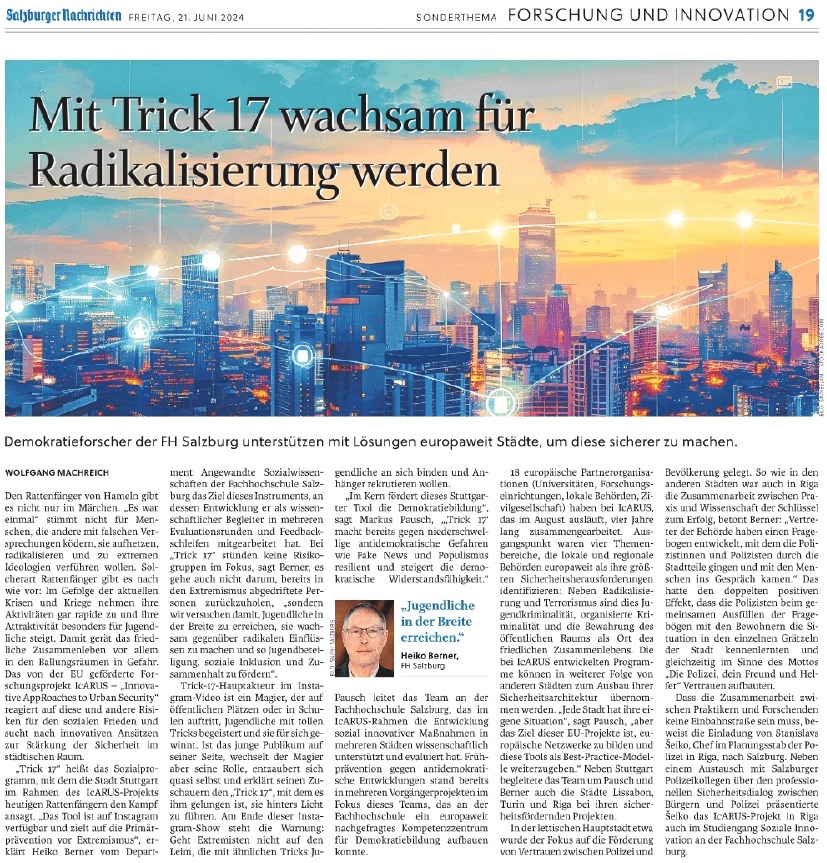Democracy Researchers from FH Salzburg Support Solutions to Make European Cities Safer

The Pied Piper of Hamelin is not just a fairy tale. “Once upon a time” doesn’t apply to people who lure others with false promises, radicalize them, and lead them to extreme ideologies. Such Pied Pipers still exist today: In the wake of current crises and wars, their activities are rapidly increasing, and their attractiveness to young people is especially high. This puts peaceful coexistence, especially in metropolitan areas, at risk. The EU-funded research project ICARUS – “Innovative AppRoaches to Urban Security” responds to these and other risks for social peace and seeks innovative approaches to strengthening safety in urban spaces.
“Trick 17” is the name of the social program that the city of Stuttgart uses as part of the ICARUS project to address these Pied Pipers, says Markus Pausch from FH Salzburg. The tool is available to all partners and aims primarily at preventing extremism, explains Heiko Berner from the Department of Applied Social Sciences at FH Salzburg. Its goal is to establish it as a scientific tool, in cooperation with evaluation rounds and feedback sessions. In “Trick 17,” the focus is not only on risk groups, Pausch adds, but also on reintegrating already radicalized individuals, “We try to widen the range, to achieve broad societal influence, and to promote social inclusion and democratic resilience.”
The Trick-17 main program video is shown in schools and public places where the magician, performing tricks, warns the audience not to fall for such Pied Pipers. “Trick 17” uses a sophisticated light show to convey this message. The warning: “Youth in general reach out.”
Pausch leads the team at FH Salzburg, which scientifically supports and evaluates the development of socially innovative measures within the ICARUS framework in several European cities. Early prevention against antidemocratic developments is the goal, emphasizing FH Salzburg’s expertise center for democracy building.
18 European partner organizations (universities, research institutions, local authorities, NGOs) have been working together in ICARUS for years. Different thematic focuses address the major security challenges in various regions: besides radicalization and terrorism, these include gang crime, organized crime, and the preservation of social cohesion. The programs developed under ICARUS can be adapted and applied elsewhere, including the involvement of local populations in the security architecture. “Each city has its unique situation,” says Pausch, “but the goal of these EU projects is to develop models that can be adapted universally.”
Stuttgart, along with other cities like Lisbon, Turin, and Riga, has successfully implemented this approach. For example, in Riga, the collaboration between police officers and the public was essential for success. Berner emphasizes that local authorities developed a questionnaire to engage with residents and understand their concerns directly. This process built trust in the police as “friends and helpers.”
The cooperation between practitioners and researchers is further evidenced by the invitation of Stanislavs Šeiko, head of the Riga police planning staff, to Salzburg. An exchange of experiences with the professional security service between citizens and police presented ICARUS projects in Riga was also presented during the “Social Innovation Studies” lecture series at FH Salzburg.
The aim of these initiatives is to build trust between the police and the community, making it easier for law enforcement to understand and address the specific issues within different neighborhoods. This dual approach not only helps in crime prevention but also strengthens community ties, fostering a sense of collective security and cooperation.
Key Points:
- Multinational Cooperation: The project involves 18 European partner organizations, including universities, research institutions, local authorities, and NGOs.
- Focus Areas: Addresses major security challenges such as radicalization, terrorism, gang crime, and organized crime, aiming to preserve social cohesion.
- Innovative Approaches: Programs like “Trick 17” use creative methods to engage and educate the public, particularly the youth, about the dangers of extremism and the importance of social inclusion.
- Local Adaptation: While the core principles of the programs are consistent, each city can adapt the strategies to fit its unique situation, ensuring relevance and effectiveness.
- Trust Building: Emphasizes the importance of trust between the police and the community, achieved through direct engagement and responsive actions.
The ICARUS project exemplifies how collaborative efforts and innovative strategies can enhance urban security and social cohesion across Europe. By involving a diverse range of stakeholders and focusing on both prevention and reintegration, these initiatives aim to create safer, more resilient communities.

subscribe to be the first to receive icarus news!
Know what we've been up to and the latest on the European urban security frame.









